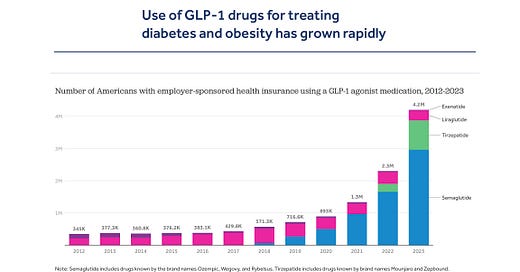Here are three things I liked this week. And at the bottom I share something that I’m thinking about with three compelling questions to ask of yourself.
AI Scribes — Not quite ready for prime-time
In New England Journal of Medicine Catalyst there was a fantastic breakdown of AI scribes and what we know about them. It’s outside the paywall and worth a look. Spencer Dorn from UNC Chapel Hill Medicine broke it down in a LinkedIn post (slightly condensed, and emphasis is mine):
While most physicians and patients reported a highly positive experience, the estimated time savings were quite modest. Compared with non-users, AI scribe users observed 18 seconds (0.3 minutes) in net time savings per appointment and one minute (total!) less pajama time the entire day. High users saved slightly more, but the results are underwhelming.
Second, the Peterson Health Technology Institute’s outstanding new report concluded that while AI scribes reduce clinician burnout and improve patient experience, there's little proof they boost efficiency or productivity—and a real risk they could drive up the total cost of care.
Let’s be clear: AI scribes help some physicians, particularly those who struggle with documentation, get through their day. Users report scribes reduce their cognitive load and let them spend more time looking at their patients instead of their screens. There are reasons that about one-third of TPMG clinicians use AI scribes regularly. But there are also reasons that two-thirds do not.
At least in their current form, AI scribes seem too limited to significantly boost efficiency or save substantial time. We must remember that conversations inform only one-third of notes, and note-writing is just one of many workflow activities. If AI scribes are to make a greater impact, they’ll have to move beyond documentation. Some already are.
AI companions — The attention economy on steroids
Designed to be the perfect person—always available, never critical—AI companions are hooking people deeper than social media ever could. This chilling story in MIT Tech Review unpacks this rapidly growing AI application. It’s a quick read and it’s outside the paywall. This week I’ll be talking to the author of this story, James O’Donnell, for the podcast.
In the social media we’re used to, as the researchers point out, technologies are mostly the mediators and facilitators of human connection. They supercharge our dopamine circuits, sure, but they do so by making us crave approval and attention from real people, delivered via algorithms. With AI companions, we are moving toward a world where people perceive AI as a social actor with its own voice. The result will be like the attention economy on steroids.
Health spending issues to watch this year
KFF Peterson published a fantastic summary of U.S. health spending issues to watch this year. I’m not a policy wonk, but it’s loaded with interesting stats on GLP-1 spend, PBM legislation, cross-state licensure compacts, and evolving policy on site-neutral payment — ie, eliminating facility fees. This graphic on the growing coverage of GLP-1 spending by employer sponsored plans is eye-popping.
What I’m thinking about | The age of choices
“Beyond the age of information is the age of choices.” — Charles Eames
We live in a different age. Earlier generations faced scarce opportunities and fewer decisions. Choices were limited and predictable. The TV channels were ABC, CBS, or NBC. The newspaper: your local daily or The New York Times. Now abundance has taken center stage, transforming our interactions with the world and one another.
Now, abundance defines us. The internet, AI, and constant phone access flood us with options—from dating to delivery.
But more choice brings more pressure. This is the paradox of choice. Some is good; too much overwhelms. Sartre said, “We are our choices.” In the digital age, even small decisions shape identity. Every decision, no matter how trivial, becomes a conscious act of self-definition.
Show me your choices, and I’ll show you your values.
Of course, value itself has shifted. It’s not just about price—it’s about attention, emotion, and meaning. Every choice reflects not just what we want, but who we are.
As we struggle with choice we need strategies for decision-making that focus on what matters. This is the paradox of our time: to navigate the landscape of choice in the pursuit of self-definition and meaningful engagement with the world.
3 questions to ask yourself:
What do I pay attention to?
When do I not listen?
What will I never want AI to do for me?
What choices will you make?
Thank you again for being a subscriber. If you could share this with a friend it would help me a lot. — Bryan



i guess i cant quite fathom that 18 sec savings...seems really low from my experience